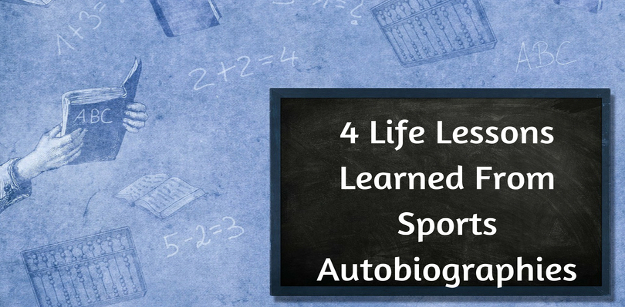Sports autobiographies might seem like a niche topic but for the majority of them, you can extract the lessons and ideas from the writer and apply them to all areas of your life.
These are 4 life lessons I’ve started to think about having taken notes from reading sports autobiographies over the last few months.

1. Sacrifice Isn’t A Bad Thing
Sacrifice for me has always been a negative word. When I was growing up, sacrificing something meant I was giving up something which I didn’t really want to do. Nadia Comaneci, Olympic gold medalist in gymnastics, approaches sacrifice differently. As a 14 year old gold medalist, many assumed she had sacrificed a lot. But in her book, Letters to a Young Gymnast, she said:
“Life is full of sacrifices, but I loved what I was doing, which is more than can be said for most people.”
Lesson: If you love what you’re doing, whatever people say you’re giving up doesn’t matter (it’s usually others saying you are making sacrifices).
2. Having A Reliable Place To Be Alone Is Important
This is something that has popped up in a few books. Athletes who are surrounded by people ALL THE TIME love having a place they know they can get some alone time. For David Beckham he mentioned in his book, My Side, that was in his car when he was driving between London and Manchester. His family home was in London, yet he was still playing for Manchester United at the time so was often driving back and forth. Many hate driving alone, but he really appreciated that time to himself.
Lesson: Find a place where you know you can always have time to yourself.
3. Being Relentless Is What Makes You Great
I’ve only just started diving in the book, Relentless by Tim Grover, the man who trained Michael Jordan and Kobe Bryant to name just two. He makes it clear early on that to be great, you can’t stop when you reach the top. There is no finish line. When people think you’ve
This is in contrast to the boxer Roberto Duran. He is one of the greatest fighters of all time, but he certainly could have had a better record. I wouldn’t class Roberto as a Cleaner. A Cleaner has the ability to trust his instincts, shut out doubt and fear, and keep going when everyone else had given up.
When he gave up mid-fight in the second fight Sugar Ray Leonards he could have kept going. Even though he had stomach cramps, he could have kept going. He knows he made a split second decision that wasn’t the right one. But that ended his chance at being called a cleaner. I’ll give him credit though, he had a lot of fights after people thought he was too old to box. If he didn’t need the money though, he may not have had such a long career.
Lesson: When I choose to do something, I need to be relentless if I want to achieve my goals. And then be prepared to achieve more. Always pushing, constantly exploring new ideas for the tiniest of improvements in all areas of life.
4. Networking Is So Much Easier When You’re Passionate (& Done So Over Long Time)
Justin Roberts was a WWE ring announcer. A job that very few get to do. He originally wanted to be a wrestling superstar, but when he came to grips with the fact his size would be a limitation, he decided he could be a ring announcer.
He was passionate about wrestling as soon as he could walk. He was watching the TV, had the toys, practiced the moves, he absorbed everything related to wrestling. He then started reaching out to pro wrestlers at the time with letters to the big stars, and would jump on the phone to anyone in any wrestling company when he could find a phone number. His goal was to get his name known, even if it was annoying for wrestlers at the time. Eventually he started asking for small favours from a connection he’d created over time. He had built trust so most people were happy to help him out…which all lead to him eventually reaching his ultimate goal of being a WWE ring announcer as he detailed in his book, Best Seat In The House.
Life Lesson: Start networking with others who share a passion with you. Even if I don’t think I’ll be involved with people directly for a few years, getting your name known early is great as time is a trust factor. The longer someone has known you, the more likely you are to be trusted.
My goal is to read 52 sports autobiographies this year. I’m excited to learn a lot more life lessons along the way.



